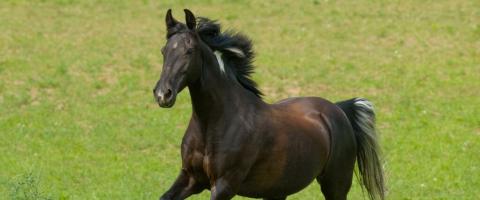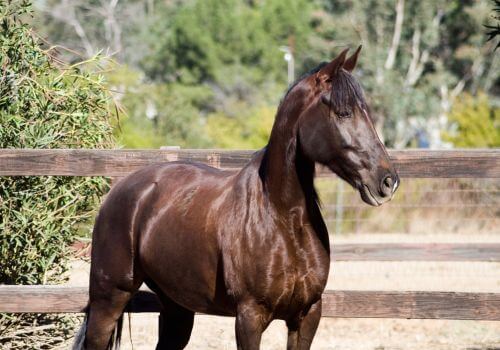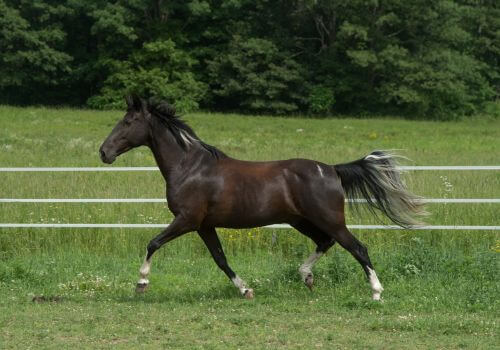
The Tennessee Walker: Smooth Moves and Southern Charm!
- Weight: 900 to 1,200 pounds
- Height: 15 to 17 hands (59 to 68 inches)
- Body Type: Finely chiseled head with a long neck; sloping shoulders and hips
- Best For: Riders of all experience levels, including families
- Life Expectancy: 30 years

Did the Tennessee Walker Come From Tennessee?
The Tennessee Walking Horse originated in the Bluegrass region of Tennessee in the late 19th century. Farmers selectively bred Thoroughbreds, Canadian Pacers, Saddlebreds, Morgans, American Standardbreds, and Narragansett Pacers to create a strong and smooth-gaited horse that was suitable for both fieldwork and comfortable riding.
Recognized for its smooth "running walk," the Tennessee Walking Horse quickly gained popularity. In 1935, the Tennessee Walking Horse Breeders & Exhibitors Association was founded to promote and preserve the breed. The Tennessee Walker became the official state horse of Tennessee in 2000.
How Big is a Tennessee Walker?
Tennessee Walking Horses stand between 15 and 17 hands tall and weigh between 900 and 1,200 pounds. They are known for their elegant build, sloping shoulders, and distinctive long neck. Their refined heads and expressive eyes give them a regal appearance.
What Are Tennessee Walkers Used For?
Bred for versatility and talent, Tennessee Walkers excel in trail riding, endurance riding, and competitive events. They are popular in both English and Western disciplines, with many performing in saddle seat and pleasure riding competitions.
Performance and show horses are sometimes equipped with padded or built-up shoes to enhance their high-stepping action. In contrast, pleasure and trail-ridden Walkers are typically flat-shod, which promotes soundness and longevity.
The Many Colors of Tennessee Walkers
The Tennessee Walking Horse Breeders’ & Exhibitors’ Association accepts nearly all coat colors. Common colors include bay, black, chestnut, white, gray, dun, palomino, and roan. Patterned coats such as overo, sabino, tobiano, and tovero are also seen in the breed.

What Makes Tennessee Walkers Special?
The Tennessee Walker is famous for its smooth, four-beat running walk, which provides a gliding ride. This gait allows the horse to reach speeds of 10 to 20 miles per hour while maintaining a comfortable rhythm for the rider. Walkers also exhibit a distinctive head nod in sync with their gait.
In addition to the running walk, Tennessee Walkers can perform the flat walk, canter, and other additional gaits, such as the rack and fox-trot.
Diet and Nutrition of a Tennessee Walking Horse
A Tennessee Walking Horse requires a well-balanced diet of quality grass, hay, grains, and occasional fruits and vegetables. Owners should monitor their weight carefully, as some Walkers are prone to obesity. Providing adequate vitamins and minerals ensures optimal health and energy levels allowing them to perform to high standards and excel in multiple disciplines.
Common Health Issues of a Tennessee Walker
Tennessee Walkers are generally hardy but can be prone to certain genetic conditions, including:
- Hyperkalemic Periodic Paralysis (HYPP): A genetic disorder that causes muscle twitching and weakness.
- Polysaccharide Storage Myopathy (PSSM): A condition that affects muscle function, leading to stiffness and discomfort.
- Malignant Hyperthermia (MH): A metabolic disorder that can cause dangerously high body temperatures and rapid breathing.
Proper veterinary care and responsible breeding can help minimize these health risks.
Grooming and Care of Your Tennessee Walking Horse
Routine grooming is essential to maintaining the Tennessee Walker’s coat and overall health. Brushing before and after rides helps distribute natural oils across their coat and skin, while also helping remove any debris picked up in the stable or during the ride. Hoof inspections should be done daily to prevent infections and injuries and keep their prized hooves in top condition.
Using a detangler on the horse's tail can help maintain its fullness, which is useful for swatting away flies. In winter, waterless shampoo can be used to clean and condition the horse’s mane and tail.
Saddling Up Our Final Thoughts
The Tennessee Walking Horse is a beloved breed known for its smooth gaits, gentle temperament, and versatility. Whether on the trails or in the show ring, this breed continues to impress riders of all experience levels.

